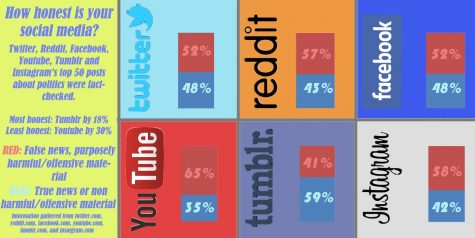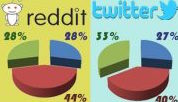False internet information permeates the crevices of daily life
November 5, 2016

When scrolling through the trending section on YouTube or any other social media site, many of the videos tend to follow a similar outline. Poorly organized videos centered around disrespecting someone, with a follow up video calling out slander. It seems that in today’s world of social media, terms like “slander” and “misinformation” are much more present than they ever were in the past.
Although social media brings many new innovative platforms of information to the table, it also has its drawbacks. As many hotheaded and reckless people are able to broadcast their messages with the world, they say things without thinking or without checking their facts. In many unfortunate situations, they do so purposefully. This combined with human nature to believe without question makes for a dangerous cocktail that seems to taint the well of information that social media could provide to many.
After rising to internet fame through his online news show, “Drama Alert”, a man named Daniel Keem came into the spotlight on many social media sites, primarily Youtube, Twitter and Tumblr for his multiple cases of false reporting. Many were completely shocked by his actions. At one point, his show had been seen as one of the most credible on the internet.
According to radio host Brian Rickman, “Meet Tony, a sixty-something widower who enjoys spending his time playing online games… Like many gamers more than half his age, Tony also live-streams his gameplay on Twitch… Tony always makes a point of remembering his followers birthdays when they join him in his chat room. When something particularly exciting happens during game-play, he often shouts, ‘yahoo!'”
In January however, Tony began suddenly receiving thousands upon thousands of hateful messages, even multiple death threats. While still on camera, Tony began to cry in a heart-wrenching display. When the dust finally settled a little, the comments began repeatedly screaming the word, “pedophile.” Tony was obviously distraught over the situation and very confused. Soon after, it was revealed that Keem had “revealed” Tony to be a pedophile to his viewers on Drama Alert. People soon noticed strange contradictions in Keem’s reporting.
Rickman said, “[A viewer] noticed that the convicted pedophile in question didn’t really look like Tony. He also found that the child predator Tony was being likened to was still in jail.” Keem had mistaken him for John Phillips, an actual online pedophile. He had not checked any sources before the show. Many speculated that Keem had purposely overlooked it in order to gain more news worthy stories.
Keem made a habit of this for the next few months, even going so far as to accuse a young man named Calvin Vail of having multiple diseases which he did not have, falsely accusing another man, Daniel Middleton, of pedophilia and using lies to cover a tape of Keem, himself, using racial slurs in an old webcam video. After the last straw, in which Keem purposely allowed false information saying that Vail had bribed his way into his job as a succesful social media commentator, Vail brought many of these actions to light and even threatened to sue Keem for slander.
After announcing Vail was going to attempt to sue Keem, he said, “At this point in time, [Daniel Keem] has literally been exposed for everything you can be exposed for. That’s not even a joke, he’s already been exposed for… slandering multiple people and falsely accusing multiple [people] of being pedophiles… as well as racism and using [false information].” This brought a particular amount of attention to the ordeal, since Vail’s YouTube channel had recently been named as one of the fastest growing social media accounts.
Contradictions and lack of conviction
So the question was left, if someone as famous and “credible” as Keem could so easily get away with multiple lies for so long, what would happen if the same were to happen with something more serious? This is what happened recently on Twitter when accounts held by Alt-Right supporters were taken down.
Alt Right supporters are known to often encourage hate-speech when it comes to immigrants, religions and racial minorities in order to further their ideal of global xenophobia. Richard Spencer is a leader in the Alt Right movement who has focused his involvement with the Alt-Right community on ethnic cleansing. On Nov. 15th, Spencer’s accounts were taken down by Twitter for purposely spreading false and dangerous information. Although Keem’s lies were sad and malicious, they didn’t affect large groups of people in the violent ways that Spencer’s did.
In explanation, Twitter said, “The Twitter Rules prohibit targeted abuse and harassment, and we will suspend accounts that violate this policy.” Spencer reacted viciously, even bringing up Nazism and claiming that he had been “digitally killed.”
More controversy arose when Matthew Heimbach, another Alt-Right supporter, began to criticize Twitter’s move and then posted a slew of violent Tweets. According to Jessica Guynn of USA Today, “Heimbach said he received a warning from Twitter on Wednesday that some of his tweets violated the company’s terms of service. He says he was told to delete the tweets.”
One of the Tweets Heimbach was asked to delete that gained the most attention was a joke in which he said he was going to hit protesters with his car, along with the sickening hashtag, “#HitTheGas.” He tried to argue that Twitter should verify hate speech accounts, because they are “politically motivated,” but his point was mute, considering hate speech Twitter pages are actually not allowed on the website according to its terms of service. As more accounts were deleted and Heimbach continued to make more nonsensical requests, Alt-Right supporters went on a rampage. Deleted accounts were referred to as “casualties,” belittling actual causalities of real wars and their families.
Don’t eliminate the good to censor the bad
No matter if it’s about internet celebrities or contradictory Twitter pages, false information spreads like the bubonic plague on the internet, but the truth is, it must remain in order to keep the internet as honest and as raw as it is. Up until recently, one of Twitter’s taglines was “[we are] the free speech wing of the free speech party.”
Twitter made the right decision in terminating Spencer’s account, considering it broke already established rules that he overlooked, but crowds calling for internet fact-checking and censorship are going to be met with something far worse if their ideas pull through. An internet that is monitored with the purpose of elimination could easily become corrupt and just the slightest hint of bias in the process could drastically alter how younger generations would see the world through social media.
According to senior Dan Onufer, “I’m not sure the information is 100 percent correct half of the time. People will just tweet out whatever and everyone will just say, ‘Look it’s real, I saw it on the Internet!’” Even many news sites are not checked for false information, but that is a risk that is worth taking when it comes to the Internet.
While some like Keem, Spencer and Heimbach abuse that freedom of speech and that instant credibility, they are not the only ones in the world using social media. Many other users use that freedom to express new ideas and to help eliminate that misinformation for others on the Internet. Proving or destroying false rumors should not be the job of the social media websites, but the job of the people who use them, instead. Simply googling what can be seen on any website or looking into an author’s bio to check for bias can prove much more than simply eliminating what they have to say, entirely.
For one thing, in situations like Keem’s where the fiasco gained large amounts of attention, it teaches people to do a little more research. For example, when a few months later, another Youtube user tried to follow in Keem’s footsteps and falsely claim that he had been stolen from multiple times by different internet celebrities, many fans of Vail and others who had been wronged by Keem quickly stepped forward and disproved what he was saying. If they had never experienced something like it before, it could have easily gotten out of hand rather than being quickly defused.
Onufer said, “[On social media], people are caring more and joining bandwagons with other people to support or joking around about it and not being very serious.” The Internet is a mixed bag when it comes to information, but it also helps people sort out what is wrong and what is right.
After Spencer and Heimbach’s Twitter rages made news, many Alt-Right supporters began doing more research into what exactly had happened. They brought Spencer’s ignorance to Twitter’s rules to light and he realized why his account had been terminated. Although he stated he did not agree with Twitter, he said that he was encouraging some negative actions which are technically against their terms of service. If groups as infamous for misinformation as Alt-Right supporters are able to learn from the Twitter suspension situation, then it is easy to see what sort of effect it will have on others who have more passion for the truth. They will be much more adept at sifting through false facts to find the true story.
Disabling terms-breaking accounts is definitely a viable option, but limiting the internet for the sake of true information is not. Yes, there are countless biased articles, hate-filled rants and falsified “exposing” videos, but that also means everyone has an equal share in what is said and that anyone’s viewpoints, no matter how true or false, or left or right, can easily surface for others to see.
Always check information found on the Internet, but don’t be afraid of it. As social media grows, so do humans and their ability to register and prove what they see, hear and agree with. People like Keem, Spencer and Heimbach who rely on false information to back up their viewpoints are no threat to anyone with valid points and evidence that they can explain and defend articulately. And although that may be difficult for some, it is a skill that is absolutely necessary for the social media heavy world humans live in today. Dedicating oneself to only expressing the truth is something that will surface above the piles of slander and misinformation and will become the social media of tomorrow.









